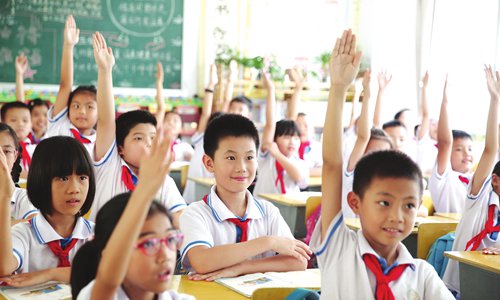HOME >> ARTS
Chinese education documentary gets people thinking
By Chen Xi Source:Global Times Published: 2019/10/9 17:36:01

Pupils attend the Haikou Yingcai Primary School in Haikou, South China's Hainan Province on May 24, 2017. Photo: IC

Students outside a school in London Photo: IC
"Success is not a question with only one answer. There are many ways to succeed. If you have one more option, you may be able to make a big difference," Chinese war reporter Zhou Yijun says during her educational TV documentary Childhood Elsewhere.
As a mother of two kids, Zhou began thinking about the elements that make good education. Having traveled overseas as a journalist, Zhou decided to seek the answers in places around the world. While filming, Zhou visited several countries including Japan, the UK, Finland, Israel and India, and visited and interviewed many teachers and students from various types of schools.
The documentary portrays various classroom experiences through the perspective of students and explores the opinions about different educational methods from parents and teachers. On Chinese media review site Douban, the documentary series has a high score of 9.2/10, with many Chinese netizens remarking on and discussing the different education methods that appear in the documentary in the comment section.
"This documentary is very open-minded. I didn't know much about the different education methods in these countries and how education is tackled in countries with different cultures and histories," one netizen commented in a review.
"Childhood Elsewhere provides audiences with multiple perspectives on education, and grasps the essential educational characteristics of various countries, like the focus on detail in Japanese education, which makes the documentary a very useful reference," Tan Songhua, a counselor at the Chinese Society of Education, told the Global Times on Wednesday.
Different methods
In the third episode of Childhood Elsewhere, students in India demonstrated their tendency to ask questions and be critical of everything.
Always willing to "find alternatives," Indian students do not accept standard answers. In one snippet, students in a university class speak proactively and constantly debate with the teacher, and even challenge her. The teachers and students seemed to enjoy holding class this way. One university teacher told Zhou that it was very common for students to ask questions to their teachers, and that they usually discuss and discover answers to these questions together. He also mentioned that sometimes the students' fresh ideas end up teaching them a thing or two.
Similarly, the primary and secondary school classes in the documentary are also the same. One teacher asks kids to debate the topic of "online shopping and shopping in real shops, which one is better," leading to the students beginning to express their own views.
"In Israel, parents ask their kids how many questions they asked at school that day, while in China the parents will be more likely to ask their children if they understand and remember all the knowledge that their teachers taught on the day," Tan said.
Tan said Chinese teachers and parents tend to pay more attention to the memorization of facts and knowledge from the textbooks, in turn ignoring the need to foster their children's ability to solve problems and develop their own hobbies. In China, students are very good at reciting facts from textbooks, which limit the development of their minds.
When it comes to rote memorization, British students have their own opinion. One student from a private school in the UK told Zhou that if he liked a poem, he would be more than happy to commit it to memory, but when it comes to those he is not interested in, he usually forgets them in a day or so.
Chinese characteristics
The "tiger mom" style of education has continued to be controversial in the education field.
"Children need to be held to strict requirements during their growth, but the children themselves should have the motivation to learn and create," Tan said.
"The term 'tiger mom' originated from a Chinese-American mother. But we need to pay attention to the cultural differences between China and the US. The high-pressure education of US families and the relatively relaxed educational culture in the US are very good supplements, and is something we can learn from," Zhang Lei, a professor at Tianjin Foreign Studies University, told the Global Times.
High-tech education
On the India episode of the documentary, many Indian kids living in remote areas are seen using the computer room to study on their own. Although they do not have the money to travel the world, these students can still see and learn about it through internet. One Indian boy tells Zhou that he used a computer to learn to speak English.
"Installing computers in remote impoverished areas is a good way for children to learn. Both India and China are doing this. China has successfully achieved the goal of ensuring all remote areas have access to the internet," Tan said.
According to Tan, students in China can take online classes provided by the High School Affiliated to Renmin University in China, one of the famed high schools in China.
"China's digital education will have great prospects in the future," Tan said.
Newspaper headline: Paths to success
Posted in: FILM,CULTURE & LEISURE